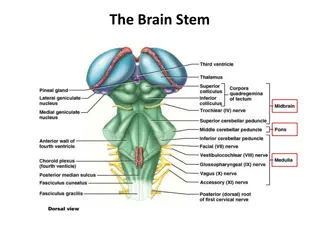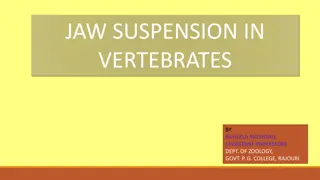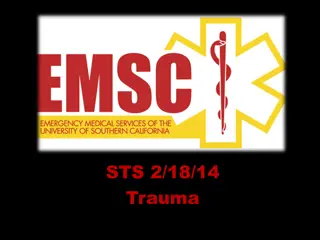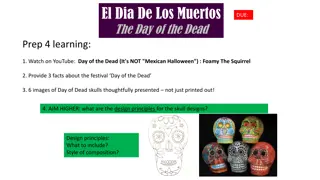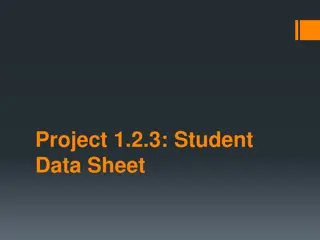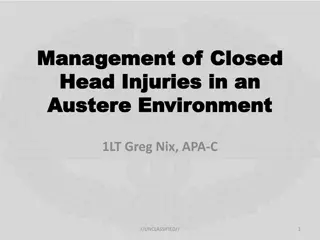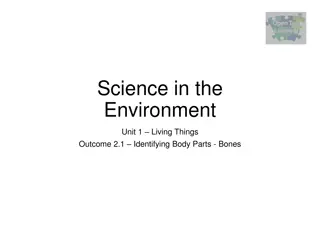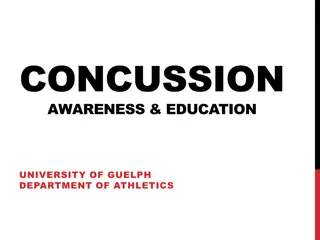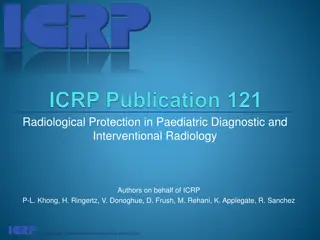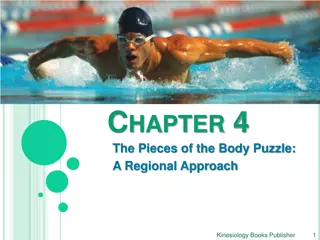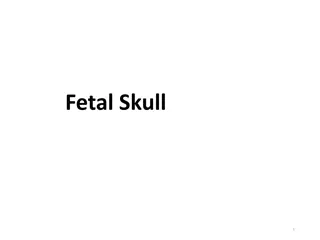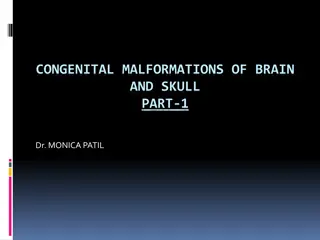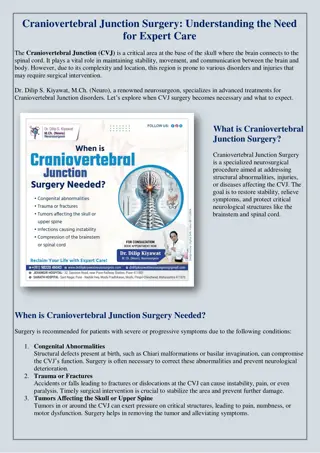Understanding the Brain Stem and its Functions
Explore the intricate structures of the brain stem, including the midbrain, pons, and medulla oblongata. Learn about the functions of the cerebellum, its role in controlling postural reflexes and producing skilled movements. Discover the thick tracts connecting the cerebellum to the brain stem and t
8 views • 20 slides
Understanding the Brain: Stem, Midbrain, Pons, Medulla, and Cerebellum Functions
Explore the complex structures and functions of the brain, including the brain stem, midbrain, pons, medulla, and cerebellum. Discover how these regions play crucial roles in controlling reflexes, movements, and vital functions like respiration and posture. Learn about the thick tracts connecting th
7 views • 21 slides
Comprehensive Overview of Maxillary Sinus Anatomy and Function
The maxillary sinus, also known as the antrum of Highmore, is a key structure in the paranasal air sinuses. Described first in 1651, it plays a vital role in skull lightening, voice resonance, and air filtration. This pyramidal-shaped sinus is lined with Schneiderian membrane and has complex vascula
1 views • 41 slides
Understanding Human Race: Characteristics and Divisions
Anthropologists recognize three to four basic races of man: Caucasian, Mongolian, Negroid, and others. Each race has distinctive physical characteristics like skull shape, facial features, and nose structure. This study aims to explore the variations in human races and their distinctive traits.
2 views • 12 slides
Understanding CSF Rhinorrhea and Its Etiology
Cerebrospinal fluid (CSF) rhinorrhea is caused by an osseous defect at the skull base, leading to a leak due to disruption of the dura mater and arachnoid. Trauma and iatrogenic factors are common causes, with non-traumatic cases often linked to high-pressure leaks or tumor growth. Diagnosis involve
0 views • 8 slides
Neuropsychology Tutorials and Study Tips by Dr. Sharon Truter
Dive into the world of neuropsychology with tutorials by Dr. Sharon Truter. These insightful sessions cover anatomy, pathology, and essential aspects for aspiring neuropsychologists. Receive expert guidance, study tips, and valuable resources to excel in your SACNA exam. Explore the fascinating real
0 views • 39 slides
Jaw Suspension in Vertebrates: Types and Mechanisms Explored
Jaw suspension in vertebrates involves the attachment of the lower jaw to the upper jaw or skull for efficient biting and chewing. Different types of jaw suspensions exist, such as holostylic and autosystylic, each based on modifications in visceral arches. Holostylic suspension involves the lower j
0 views • 10 slides
Understanding Human Evolution: From Ancestral Lineage to Modern Hominids
Human evolution is a fascinating journey of change and development, where humans emerged as a distinct species. The theory of evolution highlights our common ancestry with other organisms, including chimpanzees. Evidence from fossils, genetics, and culture supports the idea of a shared ancestor amon
1 views • 23 slides
Visual Guide to Human Anatomy and Systems
Explore detailed images of human body parts and systems including face, thigh, head, hair, eye, nose, mouth, chest, arm, elbow, hand, leg, knee, foot, forehead, neck, ear, lip, tongue, tooth, teeth, finger, waist, calf, muscle-skeletal system, skull, shoulder, rib, spinal cord, hip, limbs, joints, a
0 views • 21 slides
Understanding Murder in Common Law
Murder, as defined in common law, is the unlawful killing of a human being with malice aforethought. This act involves both actus reus (unlawful killing caused by the defendant) and mens rea (intention to kill or cause grievous bodily harm). Legal causation, including thin skull test, chain of causa
0 views • 18 slides
First Aid Tips for Common Trauma Injuries
Learn how to manage various trauma injuries such as skull fractures, eye injuries, blowout fractures, epistaxis, mouth injuries, soft tissue injuries, open injuries, and penetrating wounds with practical first aid techniques. From treating bleeding and impaled objects to saving dislodged teeth and c
0 views • 16 slides
Understanding El Día de los Muertos: Festival and Skull Design Principles
Explore the significance of El Día de los Muertos, uncover three key facts about the festival, view creatively presented skull images, and delve into the design principles behind the iconic skull designs. Discover the artistic elements and cultural depth of this celebrated tradition.
0 views • 11 slides
Sex Determination Through Bone Analysis in Forensic Anthropology
In forensic anthropology, the pelvis and skull are crucial in sex determination, with additional assistance from femur, tibia, and humerus measurements. This data sheet guides on circling male or female based on traits like sub-pubic angle, pelvic cavity shape, eye orbit sharpness, zygomatic process
0 views • 33 slides
Management of Closed Head Injuries in an Austere Environment Overview
Understanding the pathophysiology of brain injuries, including intracranial pressure changes and specific injuries such as traumatic brain injury (TBI), skull fractures, brain bleeds, and diffuse axonal injuries. It covers classifications, diagnosis, and treatment approaches for mild/concussion, mod
0 views • 27 slides
Exploring Human Bones: An Introduction to the Skeletal System
In this unit, you will delve into the fascinating world of human bones. From the skull to the legs, discover the vital roles each bone plays in our body. Learn about the human skeleton, identify important bones, and understand the functions of key body parts. Engage with interactive activities and b
0 views • 10 slides
Explore the Wonders of Ni - A Sightseeing Adventure
Join the exciting sightseeing tour of Ni, featuring laughter-filled moments, a surprising gas station incident, a chilling visit to the Skull Tower, a fun mall exploration, an entertaining puppet show, and a beautiful art gallery near the Forum Mall. Indulge in delicious food at Todor Restaurant for
0 views • 13 slides
Concussion Awareness and Education at University of Guelph
A concussion is a form of head injury that occurs due to a direct or indirect hit to the head or body, causing the brain to shift within the skull. It is a transient neurological event with a course of complete recovery in most athletes. Despite no accurate biomarker, it is diagnosed clinically base
0 views • 27 slides
Understanding Craniosynostosis: Premature Fusion of Cranial Sutures
Craniosynostosis is a pathological condition resulting from premature fusion of cranial sutures, leading to deformities in the cranial vault and base. It affects skull growth and brain development, with closure of sutures and fontanelles occurring by adulthood. Historical insights by Otto and Vircho
0 views • 74 slides
Radiological Protection in Paediatric Diagnostic and Interventional Radiology
Radiological protection in paediatric diagnostic and interventional radiology is crucial due to the higher risk per unit of radiation dose for infants and children compared to adults. The justification for using radiological examinations should prioritize patient benefits, with emphasis on optimizat
0 views • 36 slides
Nature Drawing Tasks for Art Class
Complete a series of nature drawing tasks including recreating shells, creating skull drawings, experimenting with mark making techniques, and working on charcoal drawings. Reflect on your work to improve and develop your drawing skills further.
0 views • 6 slides
Understanding the Classification and Features of Reptiles
Reptiles belong to the Class Reptilia and are known for their cold-blooded nature, dry skin with epidermal scales, and unique skeletal features. They are classified into different subclasses and orders based on their characteristics. The distinct skull structures of anapsids and synapsids define the
0 views • 28 slides
Understanding the Regional Anatomy of the Body: A Kinesiology Perspective
Explore the intricacies of the human body's skeletal structure through a regional approach as outlined in kinesiology books. Delve into the axial and appendicular skeleton, facial muscles, skull anatomy, importance of wearing a helmet, facial bones, back region, and the vertebral column. Learn about
0 views • 12 slides
Understanding the Anatomy of the Fetal Skull
The fetal skull is a bony cavity that protects the delicate brain and plays a crucial role in the birthing process. This detailed guide explores the composition of the fetal skull, including the bones, sutures, fontanels, regions, and landmarks. Understanding these aspects is essential for assessing
0 views • 18 slides
Understanding Congenital Malformations of Brain and Skull Part 1: Embryology and Neurulation
This educational material explores the embryological development of brain and skull structures, focusing on neurulation processes, formation of brain vesicles, and potential errors leading to malformations. From neurulation initiation to neuronal proliferation and migration, the content delves into
0 views • 62 slides
Cranio-Facial Superimposition Techniques in Forensic Anthropology
Cranio-facial superimposition is a technique used in forensic anthropology to identify a skull by overlaying an image of the skull onto a photograph or video of a missing person's face. This method involves various techniques such as photographic, video, and roentgenographic superimposition. The pro
0 views • 20 slides
Analysis of Major Themes and Symbols in Shakespeare's "Hamlet
Hamlet's internal conflict, highlighted by the responsibility to avenge his father's murder, unfolds through rising tensions and climactic moments leading to the tragic fates of characters. Symbolism, such as poison, the ghost, and Yorick's skull, adds layers of meaning. The falling action sees the
0 views • 6 slides
Understanding Liability in Negligence: Remoteness and Causation
Explore the concept of legal causation in negligence cases by delving into the tests for establishing remoteness. Dive into landmark cases like Re Polemis & Furness, Withy & Co Ltd. [1921] and Overseas Tankship (UK) Ltd v. Morts Dock and Engineering Co Ltd or (Wagon Mound) (No. 1) [1961] to understa
0 views • 12 slides
Craniovertebral Junction Surgery
This provides information about Craniovertebral Junction Surgery. The surgery may be required for congenital abnormalities, trauma or fractures, tumors affecting the skull or upper spine, infections causing instability, or compression of the brainste
0 views • 3 slides
